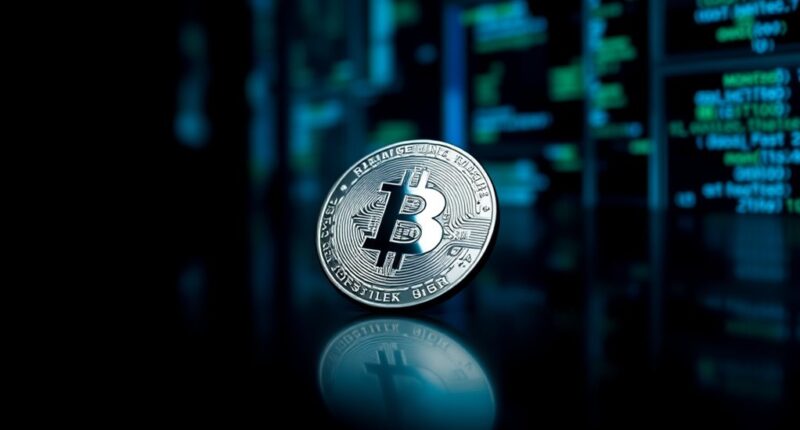Regulatory crackdowns worldwide pose significant risks to privacy coins like Monero, as governments target them for allowing illicit activities. These actions can lead to bans, delistings, and reduced liquidity, causing market instability and price drops. While some updates may push prices up temporarily, persistent enforcement efforts threaten Monero’s survival by 2025. To understand how these pressures could shape its future and what you should watch for, explore further.
Key Takeaways
- Increasing global regulatory crackdowns threaten Monero’s legality and market access, potentially leading to delistings and reduced liquidity.
- Market volatility driven by regulatory news causes sharp price swings and uncertainty for investors in privacy coins.
- Regulatory actions impact investor confidence, prompting panic withdrawals and affecting Monero’s long-term viability.
- Stricter KYC policies and exchange restrictions limit Monero’s accessibility and trading opportunities.
- The future survival of Monero depends on evolving government enforcement strategies, with ongoing risks until at least 2025.

As governments around the world intensify their efforts to regulate cryptocurrencies, privacy coins find themselves under increasing scrutiny. Authorities see these digital currencies as tools that can facilitate illicit activities, such as money laundering and tax evasion, which prompts aggressive regulatory crackdowns. These crackdowns threaten not just the legality of privacy coins like Monero but also their very existence. Regulatory measures may include bans, stricter KYC (Know Your Customer) requirements, or outright restrictions on exchanges that support privacy coins. If such policies become widespread, it could profoundly impact your ability to buy, sell, or use Monero freely. This uncertainty fuels market volatility, making the price of privacy coins fluctuate wildly as traders react to news of regulatory developments. You might see sharp drops in value following government announcements, or sudden surges if regulators back off, but the overall environment remains unstable.
Regulatory crackdowns threaten privacy coins like Monero, causing market volatility and restricting your access and use.
For Monero, specifically, the threat isn’t just regulatory hurdles but also how these crackdowns influence market perception. When governments signal a crackdown, investors often panic and withdraw their holdings, which can lead to sharp declines in Monero’s price. Conversely, if regulations are relaxed or delayed, the coin might experience a rally. However, the overarching concern is that persistent regulatory pressure could force exchanges to delist privacy coins altogether, severing your access and reducing liquidity. Without easy access on major platforms, the market for Monero could shrink, making it harder for you to find a place to trade or use the coin. Additionally, regulatory enforcement can be unpredictable and vary significantly across jurisdictions, adding another layer of risk for investors and users alike.
On top of regulatory crackdowns, market volatility becomes a persistent challenge. Privacy coins are inherently more volatile than traditional assets because their value hinges on user demand, regulatory news, and overall sentiment around privacy and anonymity. When governments threaten their existence or tighten restrictions, the market reacts with high volatility, often leaving you vulnerable to sudden losses or missed opportunities. This unpredictable environment makes it difficult to plan long-term investments or use Monero as a reliable store of value. You might find yourself caught in a rollercoaster of price swings, driven by news cycles that can change overnight.
Despite these hurdles, Monero and other privacy coins continue to attract a dedicated user base that values privacy above all. But survival until 2025 depends heavily on how governments choose to enforce their regulations and whether they can curb illicit use without stifling legitimate privacy needs. If current trends persist, Monero’s future remains uncertain. Regulatory crackdowns and market volatility will likely shape its path forward, forcing you to stay vigilant and adaptable as the landscape evolves.
Frequently Asked Questions
How Do Privacy Coins Compare to Traditional Cryptocurrencies?
You might notice that privacy coins like Monero prioritize user anonymity, making transactions less transparent than traditional cryptocurrencies like Bitcoin, which emphasize blockchain transparency. While this can boost privacy and security, it can also hinder broader cryptocurrency adoption due to regulatory concerns. Privacy coins offer distinct advantages for users valuing discretion, but their limited transparency can pose challenges for mainstream acceptance and legal compliance, affecting their long-term viability.
What Are the Main Legal Challenges Faced by Privacy Coins?
You face significant legal challenges with privacy coins like Monero due to government crackdowns aimed at increasing financial transparency. Authorities worry these coins can facilitate illegal activities, leading to stricter regulations and potential bans. You need to stay informed about evolving laws and compliance requirements, as these legal pressures threaten the future of privacy coins. Without adapting, your ability to use or hold these digital assets may become increasingly restricted.
Can Privacy Coins Be Used for Illegal Activities?
You might wonder if privacy coins can facilitate illicit transactions, and the answer is yes, they can be used for illegal activities. Their strong privacy features raise significant privacy concerns, making it harder for authorities to track illicit transactions. While many legitimate users value privacy, these coins can be exploited for money laundering or other unlawful purposes, which intensifies scrutiny and regulatory challenges around their use.
What Improvements Are Planned for Monero’S Privacy Features?
You’ll see Monero plans to enhance its privacy with improvements like stronger ring signatures and more advanced stealth addresses. These features already help obscure transactions, but updates aim to bolster security and anonymity further. By refining ring signatures, Monero makes it harder to trace, while new stealth address techniques increase recipient privacy. These planned upgrades ensure Monero remains a leading privacy coin, better protecting user confidentiality in an evolving digital landscape.
How Do Regulatory Changes Impact the Future of Privacy Coins?
Regulatory implications considerably impact your ability to use privacy coins like Monero. Authorities focus on privacy concerns, fearing they facilitate illegal activities. As regulations tighten, you might face restrictions or bans, making it harder to access or transact with these coins. Staying informed about legal developments helps you navigate these changes and understand the future landscape of privacy coins amid evolving regulations.
Conclusion
As privacy coins face increasing scrutiny and regulatory challenges, it’s understandable to worry about Monero’s future. However, your interest in privacy and security keeps these coins relevant. While obstacles are ahead, Monero’s strong community and commitment to privacy suggest it could adapt and survive through 2025. Stay informed and vigilant, because the fight for privacy in crypto isn’t over yet. The future depends on how well you and others support these technologies.









